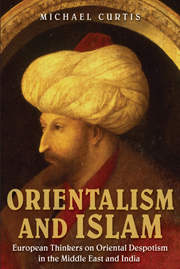Book contents
- Frontmatter
- Contents
- Acknowledgments
- Introduction: What's Past Is Prologue
- 1 European Views of Islam and Their Correlation with Oriental Despotism
- 2 Observant Travelers
- 3 Political Thinkers and the Orient
- 4 The Oriental Despotic Universe of Montesquieu
- 5 Edmund Burke and Despotism in India
- 6 Alexis de Tocqueville and Colonization
- 7 James Mill and John Stuart Mill: Despotism in India
- 8 Karl Marx: The Asiatic Mode of Production and Oriental Despotism
- 9 Max Weber: Patrimonialism as a Political Type
- 10 Conclusion
- Notes
- Select Bibliography
- Index
7 - James Mill and John Stuart Mill: Despotism in India
Published online by Cambridge University Press: 05 June 2012
- Frontmatter
- Contents
- Acknowledgments
- Introduction: What's Past Is Prologue
- 1 European Views of Islam and Their Correlation with Oriental Despotism
- 2 Observant Travelers
- 3 Political Thinkers and the Orient
- 4 The Oriental Despotic Universe of Montesquieu
- 5 Edmund Burke and Despotism in India
- 6 Alexis de Tocqueville and Colonization
- 7 James Mill and John Stuart Mill: Despotism in India
- 8 Karl Marx: The Asiatic Mode of Production and Oriental Despotism
- 9 Max Weber: Patrimonialism as a Political Type
- 10 Conclusion
- Notes
- Select Bibliography
- Index
Summary
One of the early English admirers of Alexis de Tocqueville was John Stuart Mill who immediately recognized the first volume of Democracy in America as “an excellent book, uniting considerable graphic power with the capacity of generalizing on the history of society.” After the publication of Tocqueville's second volume, Mill thought rather differently that the work was “really abstruse, by being so abstract and not sufficiently illustrating his propositions,” thus making it difficult to review. Nevertheless, Mill, in two, long admiring reviews, complimented Tocqueville on a great achievement that, he wrote, changed the face of political philosophy and the discussion on the tendencies of modern society. Like his French friend, John Stuart Mill was another public intellectual, forwarding ideas to influence politics and culture. In his discussion of Tocqueville, Mill concluded that the Frenchman's definition of democracy was not a particular form of government but equality of conditions, the absence of all aristocracy, whether constituted by political privilege or by superiority in individual importance and social power. More pointedly, in his May 11, 1840, letter, Mill praised one of Tocqueville's “great, general conclusions,” that the real danger in democracy, the real evil to be struggled against, was not anarchy or love of change but “Chinese stagnation” and immobility.
John Stuart Mill in a number of his writings was to draw a similar conclusion on the issue of stagnation. He also took a similar position to that of Tocqueville about the possible tyranny of public opinion or collective mediocrity in democratic societies.
- Type
- Chapter
- Information
- Orientalism and IslamEuropean Thinkers on Oriental Despotism in the Middle East and India, pp. 177 - 216Publisher: Cambridge University PressPrint publication year: 2009

